 |
 |
 |
Howard and Michele Hall are considered among the top underwater filmmakers in the world. They have won seven Emmys and numerous awards in the wildlife film business. Together they have decades worth of scuba diving, photography, and film experience between them, all of which they have brought to bear on the upcoming NOVAMAX large-format film "Island of the Sharks." NOVA asked them to talk about their work at Costa Rica's legendary Cocos Island.
Howard Hall: It's a great feeling. It's interesting to see animals that are so numerous and so alien at the same time. Ironically, the last emotion you feel when you see a school of 400 hammerhead sharks is fear. Hammerheads are very sensitive to noise, so they're wary of divers and very difficult to get close to. You only worry about getting close enough to get the picture. NOVA: Do they get used to you after a while? Howard Hall: Most animals will react to divers in one way or another. Hammerheads don't. They seem to be in a very inactive mode when they're at the island. The big schools are moving around, but they're not feeding on anything. Even though they're constantly moving, they're probably doing what we would call sleeping. They don't seem to notice you until they stumble across you, and then they wake up and bolt away.
Michele Hall: We discovered a spectacular crustacean called a mantis shrimp, which nobody who had been out to the island before us had ever seen before. It's about 12 or 14 inches long and lives in a burrow. As fish swim overhead it leaps out of the burrow and catches them with a big sickle-like claw.
Howard Hall: For a couple of reasons. Cocos probably has the world's highest concentration of large marine predators, including more sharks per cubic meter of water than anyplace else on the planet. The island is only 15 square miles in size, and the nearest land is 300 miles away. So it's very small and very isolated, and it's the only place in a huge vast area of ocean where large predators can go and find a reef or a place to hide out or feed. It also offered a good logistical system. The Undersea Hunter is an excellent boat capable of handling an IMAX production. So it was a combination of good logistics and really spectacular marine life.
Howard Hall: Well, Michele and I have produced six or seven television specials. Television's wonderful: it's a great way to get out there and show people what the environment is like. But after doing my first IMAX film, which was a 3-D film called "Into The Deep," I just found the big screen so much more exciting and satisfying. It's easy to get hooked on seeing an image you've captured displayed on a screen that's 80 feet high. Having done that once, it was hard to go back to seeing my films projected on a 20-inch box. Continue: What are the challenges of using an IMAX camera underwater? Cocos Island | Sharkmasters | World of Sharks | Dispatches E-mail | Resources | Site Map | Sharks Home Editor's Picks | Previous Sites | Join Us/E-mail | TV/Web Schedule | About NOVA Watch NOVAs online | Teachers | Site Map | Shop | Search | To Print PBS Online | NOVA Online | WGBH © | Updated June 2002 |
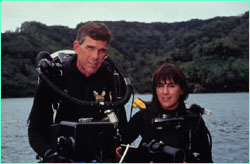 Howard and Michele Hall
Howard and Michele Hall
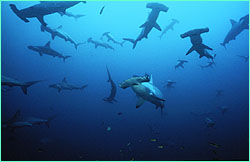 Hammerhead city
Hammerhead city
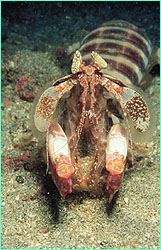 Mantis shrimp
Mantis shrimp
 Baitball film clip
Baitball film clip
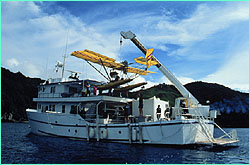 The Undersea Hunter in
Chatham Bay, with ultralight used for aerial photography.
The Undersea Hunter in
Chatham Bay, with ultralight used for aerial photography.
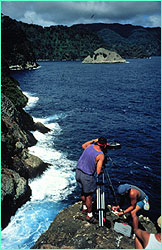 Howard Hall filming Weston Bay from Isla Manuelita.
Howard Hall filming Weston Bay from Isla Manuelita.